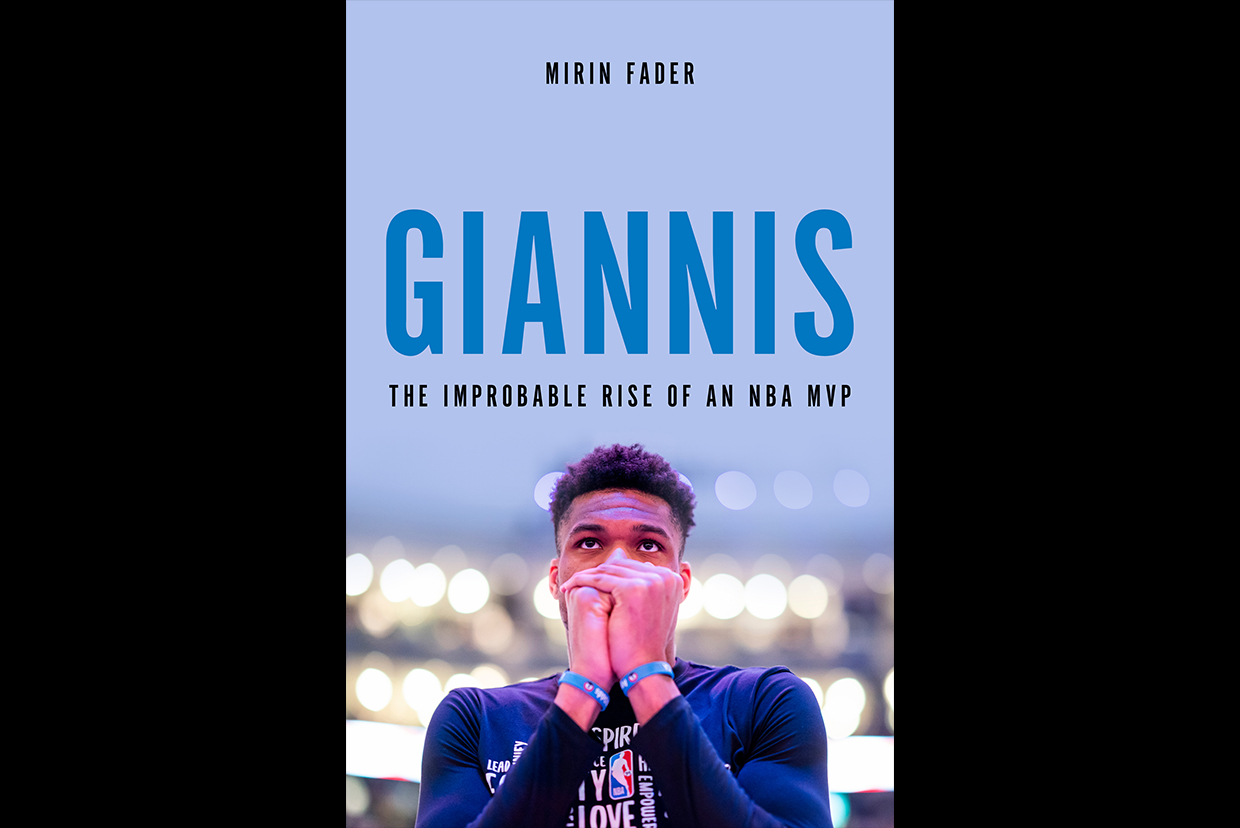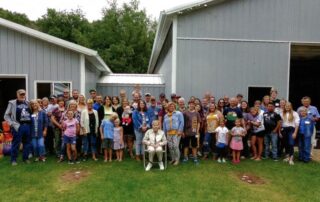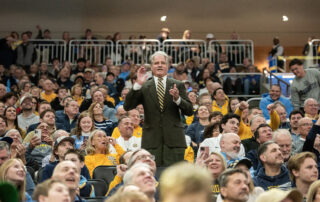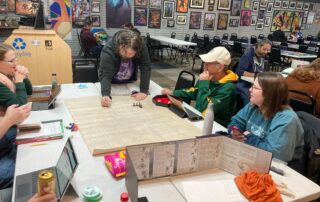The Milwaukee Bucks are NBA Champions for the first time in 50 years. A huge part of their success is because of forward Giannis Antetokounmpo — a two-time NBA MVP and NBA Defensive Player of the Year. He was named this year’s NBA Finals MVP after his dominating performance brought the title back to Milwaukee.
“Wisconsin Life” producer Brad Kolberg recently talked with Mirin Fader, a staff writer at The Ringer and author of the new book, “GIANNIS: The Improbable Rise of an NBA MVP, which was released August 10, 2021. It’s about Antetokounmpo’s Greek upbringing and his journey to basketball stardom.
(This interview has been edited for brevity and clarity.)
===
Brad Kolberg: So let’s just start at the very beginning. Where was Giannis born? Who are his parents? What was his childhood like?
Mirin Fader: Giannis was born in Sepolia, which is a neighborhood inside of Athens. It’s mostly a working class neighborhood, majority migrant area. His parents, Charles and Veronica, migrated from Lagos, Nigeria. They actually hadn’t intended to come to Greece, which is something a lot of people don’t know. They actually went to Germany because Charles was a semi-pro soccer player and he had an opportunity to play there. Unfortunately, he had a devastating, career-ending injury.
They ended up going to Greece. Sepolia was a tough place to grow up because it was very hard for Charles and Veronica to find steady employment. They were undocumented — as were their kids — because in Greece, they don’t offer birthright citizenship. So although Giannis and his brothers — Thanasis, the oldest, Kostas and Alex — were all born there, they weren’t considered Greek.
So the parents would then bring the kids to sell items on the street or at upscale beaches and try to do whatever they could to put food on the table. And oftentimes they just wouldn’t eat. Giannis’s first meal of the day might come at 11 p.m. some days. So it was really, really tough. However, there was a lot of joy as well.
BK: How did Giannis and his brothers get started with basketball?
MF: One day, Giannis and his brothers were just running along the street playing tag like normal kids do. Giannis was about 13-years-old. This Greek man, who has no connection to them named Spiros Velliniatis, sees them. Spiros says he felt God talking to him when he saw Giannis.
He saw the limbs of this young boy running and saw tremendous athleticism, calls him Mozart. Spiros is an embellisher. He is a storyteller. I say that in the book, but Spiros insists he thought he saw greatness in that.
He steers Giannis and his brothers to this club called Filathlitikos, which is about a medium sized club in the suburb of Zografou, and they play in the second division. It’s not the best. It’s the A2 division. But Spiros says, “Look, if you play basketball, I can help your family with money. Try it out, see what you think.”
BK: From there, there are issues with moving into that top tier league because his family’s undocumented. How does he go from sort of being stuck in that A2 league to becoming an NBA draft prospect?
MF: It’s miraculous. First of all, the only reason why people found out about Giannis is because he got Greek agents that knew his older brother, Thanasis. Those agents saw Giannis play and were like, “I think you have some potential here.” Those agents then sent a video of Giannis to different scouts in the NBA and international NBA scouting community.
So the scouts are looking at this video and they’re not sure what to make of Giannis. The video is so poor quality, so grainy. They can’t even tell how tall he is in relation to other people. Nevermind the fact that this is clearly a YMCA level league. It’s terrible. I mean, the players smoke outside with cigarettes before the game. They have beer bellies. This is not top tier. Top tier Greece is Olympiacos and Panathinaikos: top two A1 teams, EuroLeague talent.
But NBA scouts are intrigued because what Giannis has and what a lot of the Olympiacos and Panathinaikos players do not have is sheer athleticism, speed, court vision. He can go coast-to-coast. He plays very differently than the European game. So although Giannis is not considered a top prospect in his home country, American scouts are just tantalized by the potential.
But still, nobody says Giannis is the next big thing. Nobody says Giannis is going to be great, but the scouts do their homework and about 30 NBA GMs and scouts fly to Greece to watch him. And they’re intrigued enough that two teams really have interest: Milwaukee and Atlanta. And the Milwaukee Bucks end up drafting Giannis on a total lark because Giannis did not have citizenship and therefore his ability to travel and have a passport was limited.
So the Milwaukee Bucks are choosing at #15 (in the 2013 NBA Draft). They decide to take a swing because it’s Milwaukee and you hope to get lucky, but you expect disappointment. You don’t know if this Greek kid is going to work out, but he’s really tall and he’s charismatic and maybe he might be OK.
BK: Do you think The Bucks knew what they were getting in Giannis? Did they outsmart the process?
MF: They did not outsmart the process. And Jon Hammond, the former Bucks GM — who is now the Orlando Magic GM — was very clear with me: “Look, I don’t want to make the story more than it is.” Because he is so used to people embellishing the story, right? John Hammond sees something that others don’t. He has clairvoyant powers.
The truth of the matter is, John and every other NBA GM could not have predicted that Giannis would grow two inches while in the NBA, transform his body into a chiseled Greek god-like figure and dominate. He was a very skinny, scrawny prospect with a lot of upside, but nobody really knew how good he could be. In fact, John deserves credit because he took a swing and tried to see what would happen with Giannis.
But, you know, with Milwaukee and the owner at the time, Senator Herb Kohl, there was this idea of, “Just be competitive. Just do enough to get to the first round. We’ll get bounced out. It’s fine.” It was very mediocre so it wasn’t such a risk. But John Hammond and the Milwaukee Bucks were trying so hard to figure out who Giannis could be like, and it was hard to evaluate somebody on film where you don’t quite even know who the competition is. They knew so little about the league that Giannis played in that it was very hard to project.
There were a lot of question marks up until the night before. I mean one person didn’t even want to go on the record with me, but he said it was a huge gamble. It was a huge risk to draft Giannis.
BK: It seemed like expectations were probably justifiably low when he was drafted. Do you think that helped him at all? Was it a benefit for him to be able to fly under the radar for a little bit?
MF: It absolutely was a benefit for Giannis to fly under the radar and be such an unknown prospect, because, first of all, he was playing for a team that won 15 games that year. The only reason he gets into the game is because so many people are injured. Everyone is so miserable and there’s no hope for the playoffs that Giannis just gets to come in, make mistakes, learn on the fly and enjoy himself. Try to get acclimated to the country and the game of basketball. Not having the pressure of coming in, being defined as the superstar enabled him to grow.
This is a player that didn’t know how to weightlift before he came to the Milwaukee Bucks. Robert Hackett, the strength coach, had to teach him how to bench press, where to place his hands on the bar. So I think being such an unknown prospect allowed him to flourish. The only pressure that Giannis felt was, “How do I provide money for my family? How do I get my family to come to America?” His pressures were different than the average NBA rookie.
Giannis goes from not having a meal and not knowing where that’s coming from to being a millionaire. He is so uncomfortable with this idea of having so much money that he feels tremendous guilt and he is so isolated and lonely without his family. Everything he thinks of is, “How can I get my money to them? I don’t want to spend a dime.”

Author Mirin Fader (Photo by Hana Asano)
He would be the only player on the team to request non-direct deposit because he needed to see and feel the money in his hands to know that it was secure and he’d have it. A staffer once found a bunch of envelopes in Giannis’s apartment just filled with money. That was the everyday per diem that the Bucks provided him per day to get meals and he saved them all. He said to the staffer, “Oh, this is for my family when they come here, I’m saving it for them.”
He felt guilt when he did little things like buy two sandwiches. Why do you need two? He felt so guilty that he had this new lavish lifestyle and the people back home did not. And he just kept thinking, like, “What if I wake up and I go back to where I started?” So it was never like he made it and it was all good.
Honestly, a lot of his problems intensified once he made it because he was the breadwinner of the family. He now had that pressure to provide for so many. And yet he was still learning the language. He was still trying to figure out how this whole thing worked, not to mention adapting to the greatest basketball league on the planet. That’s hard enough for a rookie.
BK: Yeah, there’s one story that really got to me — when you mention the Bucks put them up in a luxury hotel in downtown Milwaukee and the way that he reacted to his accommodations. Can you tell us about that quick?
MF: Yeah. Giannis was so stunned that he was in this fancy hotel with fluffy pillows and everything was perfect and he just felt so uncomfortable that somebody would spend this type of money on him. He takes the mattress off and he sleeps on the floor because he just cannot accept that this is his life now.
Keep in mind, he also just didn’t have the feeling of sleeping side-by-side with his brothers. So it was even more strange to have this entire bed to himself and this room and it just didn’t feel right. So, he pulls the mattress off and he sleeps on the floor.
BK: You have another story in the book about Giannis, early in his career playing a game. His coach was Nate McMillan, who’s now the coach of the Atlanta Hawks. Can you tell us a little bit about that?
MF: Yeah, this is in the Rising Stars game and Nate McMillan is his coach. As what happens in a Rising Stars game, sometimes people play more, sometimes people play less. We’re all just trying to have a good time and get photo ops. Giannis is very serious because to Giannis, every basketball game is an opportunity to dominate. He’s not here to play games or make friends. But Nate sticks him on the bench. Andre Drummond is playing very well and Nate loses track of substitutions, Giannis is just fuming on the bench, like ‘Why am I not in the game?” And he’s a polite man. He doesn’t want to be arrogant and he just turns to Nate and he says, “Coach, what about me?” And it’s so earnest! It’s not like, “Coach put me in the game!” You know, demanding like some of these young kids do. But Giannis really felt slighted.
And so after the game, Giannis was furious and he goes up to his coach, Josh Oppenheimer — who is still the Bucs assistant coach now — and he says, “Coach, you’ll never believe it. Nate is going to pay for this!” And his coach is confused. And Giannis is like, “He put me on the bench. He did it on purpose!” And he told Nate after the game, “I’ll be back next year.” So Giannis never forgets things like that.
BK: Do you think even this year he didn’t forget? Because the Bucks played the Hawks in the conference finals. Do you think it was still on his mind?
MF: I do. I don’t know for sure. But I do know that he stores these things in his head and never forgets. And it’s funny because Nate always thinks of that story as well. Whenever he goes against Giannis, he’s like, “I wonder if Giannis remembers that I stuck him on the bench?” And I’m like, “Oh Nate, he remembers!”
BK: So family and legacy are huge themes in the book. Can you tell us a little bit about the role of family for Giannis on and off the court? His brothers, his mother, his late father?
MF: Yeah, family’s everything, to be honest. Although they had a really tough upbringing — there were times when they were evicted and had to move around a lot and weren’t sure where their next meal was coming from — there was a lot of love and joy and happiness in that childhood because he had his family. When you are used to being without, that’s just your normal. At first, you don’t think anything of it.
So a lot of memories Giannis had from his childhood were how loving his parents were. How his mom would wash his socks — the one pair of socks that he had — even if she had worked for 13 hours that day because she wanted to make sure that he had a clean pair and he was happy. Charles would sacrifice. Giannis grew up watching how his dad would pretend he wasn’t hungry and give his portions to his sons. Giannis respected his dad so much and wanted to be just like him: selfless, kind, hardworking.
Giannis’s brothers were his best friends, his comrades. They made jokes out of walking on the street or taking busses. They were always laughing. They always shared everything. There were no arguments because everything was communal. They weren’t used to, “OK, Kostas, you get this shirt, and Alex, you get this shirt.” When you share everything, there’s not much to bicker about. So they became so close that it was simply unfathomable for Giannis to play professional basketball in a city without them.
He got very emotional when he almost had the opportunity to play in Spain and his agents were like, “You’re going to go alone.” To Giannis, that’s simply not going to happen. And that is why coming to America was so hard for him, because the family’s visas got denied twice at first and it took them a while to be able to come join him.
Family is everything. That is why it was so devastating when Charles died of a heart attack at age 54, about midway through Giannis’s NBA career so far. It really changed him. It hardened him. It was obviously very sad, but Giannis has become a leader of his brothers. He inspires them and they inspire him. Everything that all of the brothers want to be is in the image of their father. They all carry that now, and they say, “I am my father’s legacy.” That’s what they all play for nowadays.
BK: Like you said, he’s the leader of his brothers. But for Alex in particular, he took on sort of a father-figure role, especially after Charles passed. How do you think Giannis is going to feel about 19-year-old Alex transitioning to have his own career, possibly overseas for some time?
MF: It’s unbelievable. I mean, Giannis has always said, “I want to win a championship. I want to be an MVP. But what I really want is for all my brothers to be professional basketball players.” Their dream is his dream. His focus has been beyond the NBA. It’s been on his brothers, and particularly Alex, because Giannis told me the one brother he really sees himself in is Alex.
Giannis went so far as to tell me that Alex can be better than him. When I heard that, I just thought, “You know, I don’t think so! I don’t think anyone could be better than you, Giannis!”
However, you look at Alex’s body right now — very skinny. You look back at where Giannis was at Alex’s age and they were nearly identical. Alex has a better jumpshot now than Giannis does now. All the brothers are saying, Alex right now is better than Giannis when Giannis was Alex’s age. So I take that all with a grain of salt.
But I know Giannis had a really long talk with Alex before Alex went to play on his first professional team in Spain for a team called Murcia. Giannis was just telling him, “Give everything, work hard, you can do this. I believe in you. I support you.” And for Alex, it was the first time where he really had to learn how to be independent of his brother.
You know, Thanasis was not on the Milwaukee Bucks for the last couple of years when it was just Giannis and Alex living in their mansion together with their mother, Veronica. Giannis would come to Alex’s high school practices and almost coach the team. He would yell, he would scream. And as Giannis told me, “I get more nervous watching Alex play than I do playing in the Eastern Conference finals.”
I say all that to say Giannis has very big expectations for Alex, but Alex is becoming his own man right now. I think it’s going to be really really cool to see if all of them can be in the NBA at the same time.
BK: So as far as Giannis and Milwaukee and the Bucks go, it seems like a really rare and special connection that’s happened over the course of Giannis’s career. Why do you think that is?
MF: Milwaukee fans, especially the ones that I talked to, are so used to people ragging on their city. They are so used to professional athletes saying, “Milwaukee? I would never want to play there.” Or, “Milwaukee? Can’t believe we have to go play the Bucks. Let’s get in and out.” They are so used to being ripped on and not covered by the national media.
And here comes the sweet, adorable seven foot generational player that not only says, “I love Milwaukee,” but he constantly says positive things about it. It is shocking and amazing to have a player so good affirm them and their goodness and their work ethic and their way of life. It is a match made in heaven. It’s a relationship built on mutual respect and love.
I think the thing that endears fans to Giannis most — and Giannis to this city — is that these fans watched him grow up. They watched him as a scrawny 18-year-old trying to find his way into now, a multimillionaire with a son and family of his own. You just don’t see that in the NBA. There’s a lot of movement happening. There’s a rush to have super teams. These fans got to know Giannis, his story and his family through a period of time. They like that success didn’t come overnight for him.
They like that he wasn’t crowned king at age 13 and expected to be great like a LeBron James or Zion Williamson. They like that this came out of nowhere. That’s the ultimate lesson of all from people that come from Milwaukee. You work hard and dream big. Giannis has done that.
BK: And now he has an NBA championship to show for it. But in your book, you have people saying, “Giannis, you may not be able to be the face of the league. You’re not American enough.” Do you think a championship changes that?
MF: I think that a championship could make Giannis the face of the league, but I think that he is not concerned with whether he can be or whether people think he can be. I think Giannis is kind of the embodiment of the quote, “What other people think about me is none of my business.” There have been moments where people have criticized him and said, “Well, he can’t be the face of the league because he has an accent. He can’t be the face the league because he’s not from here.”
For Giannis to embrace America as home while also still embracing the other places he calls home — Nigeria and Greece — makes him so multifaceted and so endearing to not just the NBA, but basketball around the world. I think it’s up to the NBA if they want to tell his story more and center him more.
What I find fascinating is that the NBA is pouring millions of dollars into global academies to find the next Giannis. To find the next international superstar. They have put so much money into grassroots basketball in India. They have just built a global academy in Australia. They are literally trying to find the next Giannis. But here in America, we’ve got Giannis, we’ve got Luca Dončić, and we’ve got “Joker” (Nikola Jokić). All of these players are miraculous players. They’re going to be the future faces and we don’t know anything about them.
So I think that if Giannis is to become the face of the league — or any of those other people we just mentioned — their stories should be front and center. I hope that this championship is the beginning of more storytelling and affirming, because the NBA is only going to get more international, not less.
What if Giannis never got his citizenship fast-tracked? He would never have gotten the papers two months before the draft and able to come to America. “Greek Freak” would have never happened.
Think of all the children of migrants that will never get their papers, that are really talented basketball players, that just don’t have opportunity. I hope this book shows that, yes, Giannis worked really, really hard and he deserves every bit of his success. But his story could have ended up like so many other children of migrants.
BK: So now Giannis is officially a superstar. He’s a two-time MVP, is defensive player of the year. The Fiserv Form could be considered the “House That Giannis Built” in some ways. And now he’s an NBA champion who has signed a supermax extension to stay in Milwaukee for several more years, at least. I mean, he’s completely transformed Milwaukee as a basketball city. What’s next?
MF: Keep in mind, Giannis is 26-years-old. He’s just beginning to mature, not just into a global basketball superstar, but into a man! A father! I think fans got a glimpse of the insight, the intellect, the thoughtfulness and things that he has to say throughout these playoffs. I think we’re going to see him use his platform and his voice in bigger ways beyond the basketball court, whether it’s talking about racial identity, current issues, social issues.
I think Giannis is primed to become a very, very important voice outside of basketball. There was a panel that he was on with President Barack Obama. And Obama said to him — this was about two years ago before the pandemic — Obama said, “Giannis, you should show yourself more. You should really, you should do more. You should just be out there more.”
I think we have witnessed Giannis go from a really scared, shy rookie, just learning the language, just finding his footing, confident, still humble, killer mentality, still humble, superstar.
I think his voice and the way he’s going to gain more confidence into who he is as a person and what message he wants to send out there is only going to become more. I think he’s going to share more of himself.
Mirin Fader is a staff writer at The Ringer and author of the new book, “GIANNIS: The Improbable Rise of an NBA MVP.”
Special thanks to ESPN and Wisconsin Public Radio’s Madeline Fox for contributing audio to this story.








